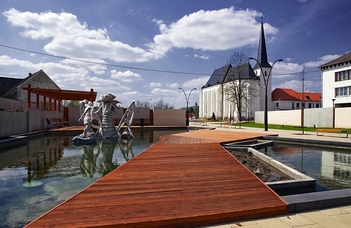Innovative urban studies in the TINLAB programme

The Environmental Psychology Research Group of the Institute for People-Environment Transaction at ELTE PPK, led by Andrea Dúll, is conducting a large-scale basic and applied research on Nyírbátor, a medium-sized town in Eastern Hungary.
Twenty-one new R&D and innovation activities, including fifteen at ELTE, will be launched in 2023 under the TINLAB programme. The Knowledge Centre, a collaboration between four institutions (University of Miskolc, University of Pannonia, Hárfa Foundation and the consortium leader ELTE), will exclusively focus on RDI activities that seek science-based answers to real societal challenges.
The research of the ELTE PPK Institute for People-Environment Transaction (EKTI) contributes to the development of more liveable cities through a multi-dimensional and multi-methodological analysis of Nyírbátor. Nyírbátor is in a very exciting position in Hungary in many respects, which also allows for modelling: the analysis of the city along the mixed methodology of environmental psychology and urbanism is not only valid for the municipality itself, but the studies can also reveal and analyse patterns of urban behaviour, the knowledge of which provides a basis for the development of research and intervention strategies that can be used in other municipalities.
The results can thus be directly applied to urban planning and development.
In the first phase of the research, a representative environmental psychology survey and architectural/urban analysis were used to gain a comprehensive picture of the previously unexplored attitudes of the city's residents towards settlement. In the second phase of the project ("Exploring complex patterns of latent and directly measurable spatial relations: the places of Nyírbátor residents"), complex transdisciplinary studies in environmental psychology, urban planning and architecture are currently being carried out to gain a more in-depth and detailed understanding of the conscious and unconscious relations of Nyírbátor residents to certain spatial situations in the context of the socio-economic processes in the town and its surroundings.
The socio-physical settlement characteristics and patterns identified not only represent novel basic People-environment transactional research findings, but also the good practices developed along these lines are summarised in a handbook, the knowledge base of which supports more humane planning and design of settlements.

